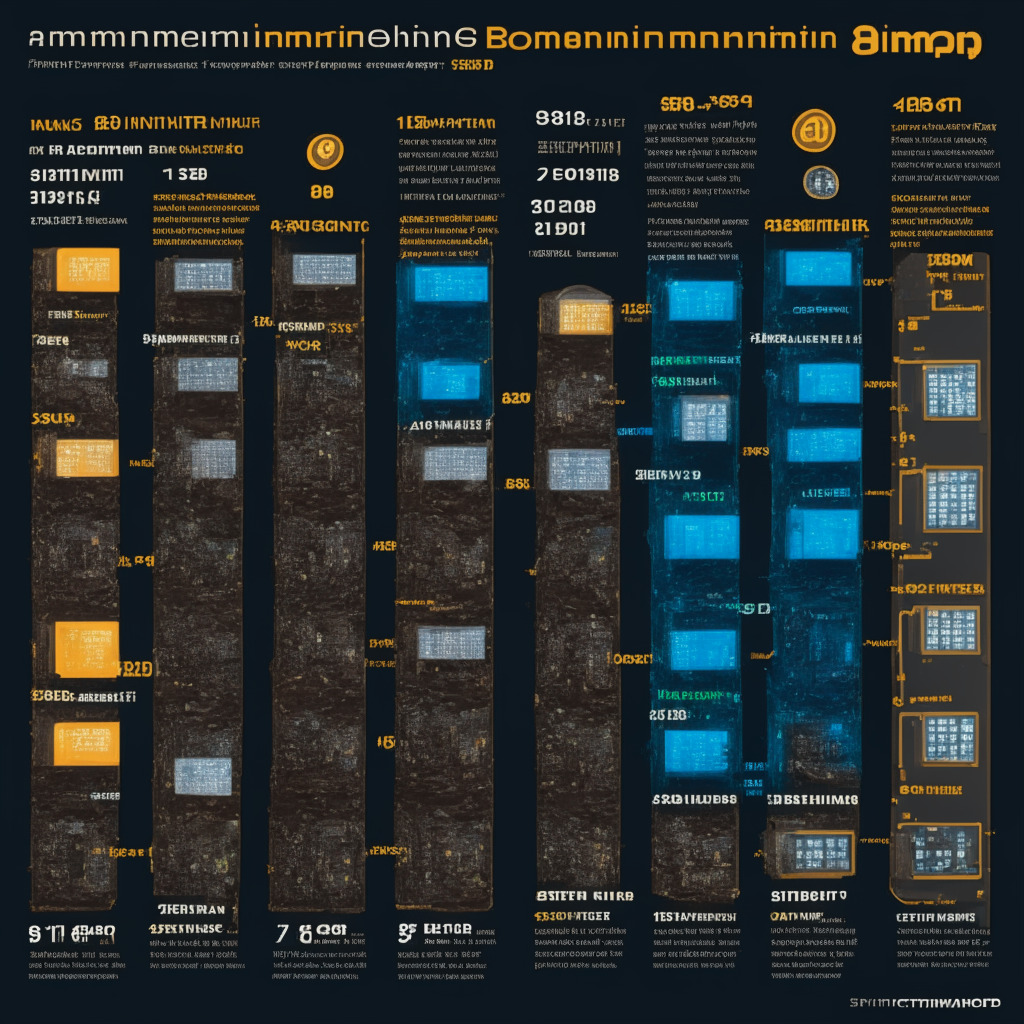Bitcoin’s energy efficiency has improved by about 60% since 2018 due to more efficient mining systems. This gain in efficiency is critical as concerns rise about the environmental impact of Bitcoin mining activities. This progress is matched with a trend towards sustainable energy sources, with 74.1% of Bitcoin’s mining power now coming from renewable energy sources.
Month: July 2023
Regulatory Tightrope: How Cboe and Coinbase Navigate Cryptocurrency Compliance
“Cboe Global Markets amends five Bitcoin ETF applications to include surveillance-sharing agreement (SSA) with Coinbase, aiming to comply with SEC’s regulations to prevent fraud and safeguard investors. This move signifies a step towards legitimizing and mainstream acceptance of cryptocurrencies, despite lingering regulatory challenges.”
Crypto Taxation in Russia: A Paradox Amidst Legal Ambiguity and Regulatory Deadlocks
Russia’s Federal Tax Service (FTS) recently affirmed that citizens can pay taxes on crypto earnings in spite of the ambiguous legal status of cryptocurrency. Two tax methodologies are proposed: personal income tax disclosures or the condensed taxation system. This starkly contrasts with the Central Bank’s anti-crypto position, hinting at a deeper inconsistency in governmental approaches to digital financial technology in Russia.
Stagnant Bitcoin: A Look into Halting Bull Runs and the Global Currency Debate
Recent market data suggest a possible stall for Bitcoin around the familiar $30,000 mark. Predicted recovery in Q4 depends on a trifecta of factors: a halt on rate hikes, Bitcoin halving, and clearing of regulatory storms, thus indicating a complex near future.
Exploring the Rise of Tokenized Treasurys: Huge Market Growth vs Security Concerns
“Blockchain-based investment products that turn U.S. Treasury bills, bonds, and money market funds into tokenized forms amass a market value of $614 million, with the potential to reach $5 trillion over the next five years. However, the tokenizing assets trend needs regulatory oversight and potential market manipulation consideration.”
Bitcoin Dance: Standard Chartered’s Bold Prediction and its Market Impact
Bitcoin’s bullish trend above $30,000 is due to factors such as optimistic outlooks, institutional adoption, and friendly regulatory environments. Standard Chartered’s speculation revolves around Bitcoin miners retaining more coins, shrinking supply, and potentially boosting the coin’s value, with a possible high of $120,000 by 2025 suggested.
Bipartisan Focus on Crypto Taxation: Seeking Clarity and Navigating Challenges
“The US Senate Finance Committee has sought input from the digital asset community on tax challenges linked to cryptocurrencies.The senators expressed concerns about unclear classifications under the Internal Revenue Code for cryptocurrencies, leading to taxation challenges. The letter highlights concerns including “wash sales” in volatile crypto markets.”
Ethereum Staking Approaches Turning Point: Regulatory Pitfalls vs Potential Yields
“Almost 20% of all Ether tokens are now locked in staking contracts, signaling a significant turning point. However, initial inflows have slowed, perhaps due to investors’ concern about potential regulatory issues. The U.S. Securities and Exchange Commission’s lawsuits against major ETH staking service providers have led to a drop in net inflow into ETH staking.”
Diverging Views on Cryptocurrencies and CBDCs: Navigating the Balance of Regulation and Innovation
The BISIH report submitted to the G20 finance ministers and central bank governors offers contrasting views on cryptocurrencies and central bank digital currencies (CBDCs), highlighting the structural flaws and risks of the crypto ecosystem, while championing CBDCs as the future monetary system. The BISIH posits that cryptocurrencies’ inherent weaknesses limit their significant impact on the monetary system, whereas CBDCs promise stability. It emphasizes not only the binary nature but the complexity of these phenomena, underscoring the challenge in achieving a balance between regulation and innovation.
Aptos Blockchain Upgrade: A Game-changer for Fungible Assets or a Threat to Staking Rewards?
The Aptos network is proposing a significant upgrade (v1.5), aimed at enhancing the conception of fungible assets like tokenized real estate. Changes include backend services improvement, supporting tokenized securities, real estate, in-game currencies, and various fungible assets but could also reduce staking rewards potentially. Market responses and the community’s scrutiny remain pivotal.
FTX’s Claims Portal Issues: A Speedy Rollout, Speedier Pull-Back, and Unfolded Chaos
The cryptocurrency exchange FTX launched a claims portal for its users during ongoing restructuring proceedings but soon went offline, causing confusion. The portal, intended for users to lodge their claims, disappeared suddenly without explanation, amid the criminal trial of former FTX CEO, Sam Bankman-Fried. Meanwhile, the crypto market shows a third week of positive inflow, seemingly detached from FTX’s turmoil.
Spot Bitcoin ETF Approval: A Leap of Faith into Uncharted Territory or Risky Business?
“Sui Chung, CEO of CF Benchmarks, discussed his optimism for the approval of a spot Bitcoin exchange-traded fund by the U.S Securities and Exchange Commission. His opinion highlights the SEC’s desire for strict safeguards for information-sharing between ETF and crypto exchanges.”
Arkham’s Controversial DOX-to-Earn Scheme: A Threat to Blockchain Privacy or Necessary Tool?
Crypto analytics platform, Arkham, unveiled a new initiative encouraging identification of anonymous blockchain address holders, attracting backlash from privacy proponents. Arkham’s “DOX-to-Earn” rewards unmasking identities behind crypto addresses, claimed to aid in identifying crypto theft perpetrators, contradicting blockchain’s fundamental privacy principles. Critics argue this exposes regular people’s identities in instances of misidentification.
UK Treasury’s Provisional Approach to Crypto Regulation: An Opportunity and Constraint
“The UK Treasury plans to exclude ‘unbacked’ tokens from its regulatory sandbox, aiming to balance innovation and consumer safety. Existing regulations are deemed sufficient for volatile assets like Bitcoin and Ethereum, whose regulatory future remains uncertain due to evolving rules for such cryptocurrencies.”
Fueling Cryptocurrency Fever: Spotlight on High-Potential Coin Opportunities Amid Inflation Forecasts
“Cryptocurrencies show positive stance amid BlackRock’s speculated Bitcoin ETF application. Coins like Mina Protocol and innovative projects like DeeLance offer intriguing investment opportunities. Mentioned tokens including $DLANCE, $COMP, $WSM, and Solana present potential for notable returns, yet caution is suggested due to high-risk nature of cryptocurrencies.”
The Invisible Border Walls in Crypto: A Deep Dive into Global Bias and Potential Growth Horizons
This article explores the global perspective on Ethereum communities, addressing the latent stigma and safety concerns associated with unconventional venues. It highlights the potential of regions less familiar for Ethereum, acknowledging their untapped user bases and their ability to provide the much-needed human stories of progress in the crypto-industry. It advocates for leveraging blockchain’s potency to transform socio-economic levels and emphasizes the need for an inclusive, global perspective.
Demise of the Dollar: Kiyosaki’s Forecast and the Golden Opportunity for Crypto
Esteemed financial author Robert Kiyosaki forecasts the “demise” of the U.S. dollar following the alliance of BRICS nations to establish a gold-backed currency, predicting a significant Bitcoin surge to $120,000 per coin. Economic shifts and increasing crypto interest indicate a potential upheaval of the dollar’s long-held position as world reserve currency.
The Untold Story: Algofi Closure, Algorand’s Technology & Regulatory Tensions in Crypto
Despite the closure of Algofi, a lending protocol founded on Algorand’s blockchain system, developers remain confident in Algorand’s technology. The unexpected shutdown highlights the complex dynamic between technological innovation and rigorous regulatory policy within the crypto landscape, emphasizing the unpredictability of the evolved financial system.
Unraveling the Bitcoin Spot ETF: Unlocking $30 Trillion or Unleashing Regulations?
Bloomberg’s ETF analyst, Eric Balchunas predicts that the Bitcoin market could unlock a staggering $30 trillion if a Bitcoin spot ETF gets U.S. SEC approval. BlackRock’s Bitcoin ETF application has stirred optimism about market expansion despite potential regulatory challenges.
Blockchain Security Flaws: Analyzing the $9m DEX Theft and the Transparency Paradox
The article outlines how a security engineer, Shakeeb Ahmed, was charged with siphoning off about $9 million from a decentralized cryptocurrency exchange. Ahmed allegedly rigged smart contracts to generate huge fees, which he later withdrew as digital currency. His actions raise concerns about the security protocols within blockchain technology, and also highlight the inherent transparency of blockchain that ultimately led to his capture.
Cryptocurrency in Political Funding: A Closer Look at FTX Controversy and Legal Ramifications
“The US authorities are investigating former FTX executive, Ryan Salame, for alleged violations of campaign finance law. The probe explores financial linkages between Salame and Michelle Bond’s congressional campaign, and the potential exceeding of federal contribution limits. This investigation raises concerns about the intersection of cryptocurrencies and campaign finance laws.”
Navigating Shiba Inu’s Downtrend: Will Innovations and a Dedicated Community Spark Recovery?
“Shiba Inu (SHIB), the ERC-20 meme coin, dipped over 90% from its peak, attributed to the US SEC’s lawsuits against Coinbase and Binance. Current projections remain bearish. However, the Shiba community and development team’s efforts, like the Shibarium and ShibaSwap, promise long-term viability.”
Shrinking Bitcoin Supply on Exchanges: Is True Price Discovery on the Horizon?
“Less than 12% of Bitcoin’s total supply currently resides in exchange wallets, a shift in supply dynamics that could favor bulls and may signal an economic trend. The concept of “true price discovery” comes into focus – a market condition reflecting fair asset value based on available information.”
$ECOTERRA: A Green Crypto Initiative Combining Investment and Environmental Action
“$ECOTERRA, the green cryptocurrency initiative, has attracted $6 million from backers, providing an avenue for investors to contribute to reducing carbon footprint while seeking significant returns. This innovative approach offers a stable asset from eco-friendly foundations and includes a unique recycle-to-earn (R2E) program promoting environmental action.”
Analyzing BlackRock’s Bitcoin ETF Bid: Information Sharing or Privacy Invasion?
BlackRock’s application for a spot bitcoin ETF includes a Surveillance-Sharing Agreement (SSA), allowing suspicious trade alerts to be shared with authorities. It includes data access for regulators and ETF providers on specific trades or traders, potentially even personal identifiable information (PII). This new addition has sparked privacy concerns among crypto traders.
The Meteoric Rise of Threads: Lessons for Crypto Mainstream Adoption and Data Privacy Conundrum
“Threads’ success lies in its seamless integration with Instagram and facile onboarding process. This offers valuable lessons for the crypto world vying for mainstream adoption: sometimes, playing alongside industry giants and providing user-friendly onboarding processes can propel a product’s success. However, without a wide network or hassle-free use, even the ideals of data privacy and decentralization will hardly drive mainstream acceptance.”
Fluctuating Fortunes: NEAR Protocol’s Q2 Report and the Future of Blockchain Resilience
The Q2 report indicates Near Protocol’s treasury declined to $900 million, due to the price plunge of NEAR tokens. Yet, the robust strategies of the blockchain entities reflect resilience amidst volatile token valuations. For the long term, a blockchain enterprise’s tech advancements, user engagement, and decentralized ecosystem value outweigh the market and token fluctuations.
An Intricate Drama Unfolds: How Scandals Might Impact Crypto and Its Regulatory Future
“Former FTX executive, Ryan Salame, is under investigation by Manhattan federal prosecutors for potential violations of campaign finance law. The inquiry concerns Salame’s contributions to Michelle Bond’s congressional campaign, arousing suspicion of federal limits evasion. This case could influence regulatory frameworks for digital asset markets.”
Blockchain and Data Storage Dilemma: The Triumph and Trial in Powering the Digital Revolution
“The continual growth of data has increased demand for effective storage solutions. Blockchain technology offers decentralized, secure, and scalable solutions. Experts propose collaboration and leveraging decentralized networks to tackle this issue. Concerns exist in integrating with pre-existing systems, however, strategies including data sharding and Layer-2 solutions may effectively expand storage capacity.”
Navigating the Crossroads: Pros and Cons of Crypto Regulation Amidst Ongoing Innovations and Concerns
“Crypto regulation remains a hot topic with structural flaws and potential benefits. The Bank for International Settlements criticizes crypto’s viability in the monetary system, while the UK Treasury suggests a five-year regulatory reprieve could benefit digital assets. However, controversies arise with technological advancements and perceived threats to decentralization principles by some pilots of Central Bank Digital Currency. Meanwhile, jurisdiction disputes in crypto markets begin.”
Exploring the Future of TV Entertainment: Blockchain, NFTs, and the Case of Krapopolis
“Krapopolis,” the first blockchain-based series from FOX’s Web3 division, is stirring conversations around blockchain and TV shows. As an NFT holder, fans control show elements, unlock unique content, and gain access to cast meetups. Despite a downturn in NFT market, the television industry is enthusiastic about integrating blockchain technology.
The Moroccan Crypto Heist: Unmasking the Deceptive Art of Spoofing in NFT Trade
“Moroccan man, Soufiane Oulahyane, stands accused of stealing around $450,000 in cryptocurrency and NFTs by creating a counterfeit version of OpenSea, deceiving users into exposing their private cryptocurrency wallet keys. This case emphasizes the critical importance of online security in trading and investing in digital assets.”































